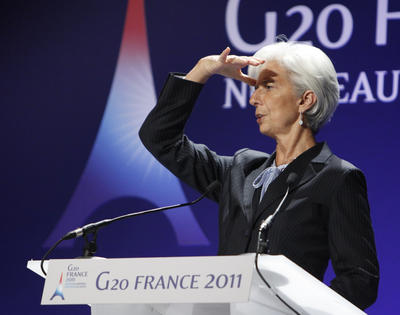There is some move to have the private sector contribute — with a new financial transactions tax being debated and writing down the value of government debt — and while the Germans are resisting, they will more than likely pay most of the cost. Germany, in particular, gained a great deal from the current euro zone arrangement, as its exports benefitted from a lower currency than might otherwise be expected. Now, if they want to sustain the structure as it is, it will cost them.
Refinancing comes with the expectation that recipient economies will also cut spending, which will subsequently build confidence about their ability to repay these debts in the longer term, and potentially reduce the moral hazard problem. But some have argued that this could well be a ‘death trap’. Spending cuts across Europe mean no strong external demand to help countries adjust while US growth also falters.
Another response would be to introduce reforms aimed at raising productivity and evening out competitiveness, as there are surprisingly high divergences among European economies in the quality of economic regulation. Labour market regulation in Portugal, for example, lowers productivity growth. Certain rules, such as those on layoffs and the provision of other services to workers, kick in at specific firm sizes, leading to a larger number of smaller and less productive firms, something which is also highly topical in Australia. Others have talked about how Italy needs a ‘change of regime’.
Though not much discussed by those focusing on the way ahead, micro reform would be a real way out of the crisis: a credible set of commitments might be valued by lenders. But in the current context, this may not work fast enough either. There are other suggestions for a response. The EU President, for example, is now calling for ‘economic union’, or an institutional set-up which would support tighter coordination of fiscal policy and presumably regulatory reform.
Greater fiscal discipline and micro reform measures should already be in play, and the financial market constraints associated with the adoption of the euro were supposed to be their key driver. That was a grand expectation. In fact, the availability of finance from the rest of the world (including East Asia), and the expectation of financiers that lending to EU governments was a good bet, actually reduced the pressure to implement any of this. In any case, the large-scale political reform that would be required to put such a package together is not likely to happen quickly enough either — or if they want to wait until it does, the Germans will be refinancing other people for a long time to come!
The crisis is therefore more likely to drive fragmentation than consolidation, given the timelines and the current situation. The question then arises of who could eventually leave the euro zone. It might seem obvious that the high debtor nations would pull out and go their own way. But Michael Pettis recently pointed out that this would risk a ‘downward currency spiral’ and that Europe might well learn from the Asian financial crisis, and the Korean experience in particular. He also refers to another discussion underway, which speculates that it could be the Germans and other northern European countries who pull out to create a new currency (mark II?) and leave the devalued euro to the southerners.
But whichever outcome eventuates, it will be an interesting scenario from the Asia Pacific’s viewpoint: the potential effects of Europe turning into a constellation of clubs, even overlapping for different purposes, would not be limited to those European countries alone — though France would have an interesting choice to make in such a scenario, and this is perhaps what the English always thought should and would happen.
It is clear now that the EU should have worked harder and sooner on real reform. Europe’s leaders should not have done this in a ‘one-size-fits-all’ manner, as it has not been effective. The current crisis is an important lesson for promoters of sophisticated Asian integration and also for those worried about two-speed structures in existing federations. And the lesson is: do not lose sight of the never-ending task of structural reform, expect diversity in responses across economies and keep productivity growth going.
Professor Christopher Findlay is Executive Dean of the Faculty of the Professions at the University of Adelaide.


It is a common complaint that Germany has benefited from the EURO. However, I have not seen proof for that. How much has the country gained (and beyond the relative gain that every country has had from free trade and reduced transaction costs in the currency union)? The German economy has shown remarkable capability to adjust to changing circumstances. It is by no means likely that it would have shown equal capability if the Deutschmark had remained.
Most mainstream economists and politicians tend to think in a flexible exchange rate regime as the best and that can sometimes become a barrier to creative thinking.
In the current situation, for example, Greece could exit the euro and start using a new national currency without being destined to fall into a downward currency spiral if it pegs to the euro with a certain and appropriate own currency real depreciation. I don’t see it would be inevitable that what occurred in the Asian financial crisis in 1997 would be repeated if Greece, or any small number of existing euro zone countries exit the euro. A dual and pegged currency in the current eurozone would present a sensible adjustment from the current effectively fixed exchange rate equivalent from 1 to 1 to a x to 1. Essentially it would create a much more flexible adjustment mechanism without necessarily introducing increased risks.
Why don’t economists think in this way?